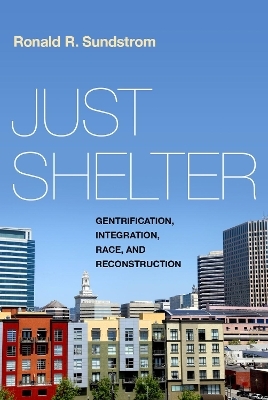
Just Shelter
Oxford University Press Inc (Verlag)
978-0-19-094814-6 (ISBN)
This crisis didn't arise from the specific circumstances of the housing market or shortfalls in the construction of new homes or increased labor and material costs. The current housing crisis is the result of state-sponsored discrimination in housing and land-use policy and the enforcement of racial and class-based discrimination by neighborhoods and cities. All of these phenomena have had long-lasting effects on access to housing and educational and economic opportunity.
Just Shelter is a work of political philosophy that examines the core injustices of the contemporary U.S. housing crisis and its relation to enduring racial injustices. It examines the harms of segregation, and asks: are desegregation or integration morally required of our communities and societies? Are the concerns that are expressed about gentrification related to the moral and political concerns that we have with segregation? Is there a moral imperative, and would it be politically legitimate, for our communities and society to mitigate or stop gentrification? Just Shelter investigates gentrification, segregation, desegregation, integration, and homelessness. To achieve justice in social-spatial arrangements, federal, state, and local governments must prioritize the crafting and enforcement of housing policy that corrects the injustices of the past. If we do not address the history of racism in housing policy, we will never solve today's housing crisis.
Ronald R. Sundstrom is Professor of Philosophy at the University of San Francisco. He is also a member of USF's African American Studies program, teaches for the university's Honors College, and is the Humanities Advisor for the SF Urban Film Festival. His research has focused on the philosophy of race, mixed-race identity and politics, political and social philosophy, justice and ethics in urban policy, and African American and Asian American philosophy. He published several essays and a book in these areas, including The Browning of America and the Evasion of Social Justice.
Introduction
Acknowledgements
Chapter 1: Justice and Social Spatial Arrangements
1.1 Introduction
1.2 Spatial Justice
1.3 Equality and Social Spatial Arrangements
1.4 Distributive Justice
Chapter 2: Open Cities and Reconstructive Justice
2.1 Introduction
2.2 Reaching for Transformation
2.3 Open Communities and Substantive Opportunity
2.4 Rectifying Enduring Injustice
Chapter 3: The Trouble with Gentrification
3.1 Bad Techies
3.2 The Concept of Gentrification
3.3 Two or Three Cheers for Gentrification
3.4 Here's the Thing about Displacement
3.5 Harms and Inequality
Chapter 4: The Harms of Gentrification
4.1 The Harms
4.2 Distributive Justice
4.3 Cultural Loss
4.4 Democratic Inequality
4.5 Pragmatic Rectification
Chapter 5: Segregation and the Trouble with Integration
5.1 Know Your Place
5.2 The Concept of Social-Spatial Segregation
5.3 The Benefits of Segregation
5.4 The Harms of Segregation
5.5 Integration as Evenness and Mobility
5.6 Integration is not a Proxy for Justice
Chapter 6: Reconstructing Integration
6.1 What Remains of Integration
6.2 Integration as Reconstruction
6.3 Outcomes, not Conversion
Chapter 7: Conclusion
7. Discomfiting Justice
Bibliography
| Erscheinungsdatum | 27.12.2023 |
|---|---|
| Verlagsort | New York |
| Sprache | englisch |
| Maße | 203 x 145 mm |
| Gewicht | 408 g |
| Themenwelt | Geisteswissenschaften ► Philosophie |
| Sozialwissenschaften ► Soziologie | |
| ISBN-10 | 0-19-094814-0 / 0190948140 |
| ISBN-13 | 978-0-19-094814-6 / 9780190948146 |
| Zustand | Neuware |
| Informationen gemäß Produktsicherheitsverordnung (GPSR) | |
| Haben Sie eine Frage zum Produkt? |
aus dem Bereich


